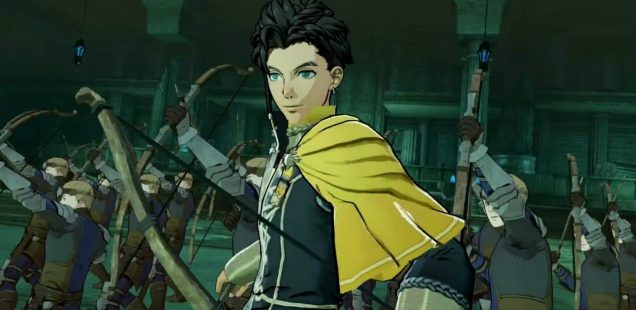
Fire Emblem’s Twelve-Year Revolutionary Project
Aaron Lascano is ready to tear down some walls.
When Fire Emblem: Three Houses’ trailers first hit the internet, I had a mixed reaction to Claude. I was glad to see a person of color as a protagonist in a Fire Emblem game, but I also had doubts about how he would be portrayed. I snickered, thinking that even though Claude was brown-skinned, the game would fail to recognize or engage with notions of race. But when I played the game, I was dumbfounded. Not only does the game recognize Claude’s ethnicity, it thoughtfully develops his narrative around coming to terms with his identity. As I grappled with the presentation of Claude’s heritage, I realized that it isn’t without precedent in the Fire Emblem series: the writing around Claude parallels the writing around Micaiah from 2007’s Fire Emblem: Radiant Dawn.
When Radiant Dawn released in 2007, its tale of children rebuilding a world wrecked by the wars of their parents captivated me as a Latinx kid growing up in New York City in the aftermath of 9/11. One of its protagonists, the miracle-worker Micaiah, is of mixed beorc (what we think of as human) and laguz (people who can shapeshift into specific animal forms) heritage, just as Claude’s parents are from the nations Fódlan and Almyra. Broadly, both games explore racism, imperialism, and revolution from the perspective of their mixed heritage protagonists. When taken together, both games model the kinds of subversive power that can break cycles of imperialist violence and oppression.
Much of Radiant Dawn’s narrative forces players to contend with not only the physical violence enacted by empires, but the cultural violence that empires enact to justify colonization against other cultures. At the beginning of the game, Micaiah’s home country Daein is occupied by the army of the Begnion Empire, the result of a war begun by Daein’s previous king. Even as Begnion forces the citizens of Daein into labor camps, Micaiah hesitates to spearhead a revolution because of her heritage. Beorc nations have long stoked racism against laguz to justify colonization, leading laguz to distrust beorc. As a result of these conflicts, individuals with beorc and laguz parents are persecuted by both societies. Micaiah conceals her identity, but her mixed heritage produces physical characteristics that threaten her cover. Individuals with beorc and laguz parents age slowly, and some develop extraordinary skills in magic simply because of their heritage. Micaiah has developed the miraculous ability to cure wounds at the cost of her own vitality—an ability that evokes the costs that marginalized people pay when struggling to address injustices and heal societal wounds. Finally, her lineage is literally inscribed upon her hand in the form of a magical sigil known as a Brand. By portraying the source of Micaiah’s abilities as her mixed heritage, the game suggests that there is power in the blending of cultures.
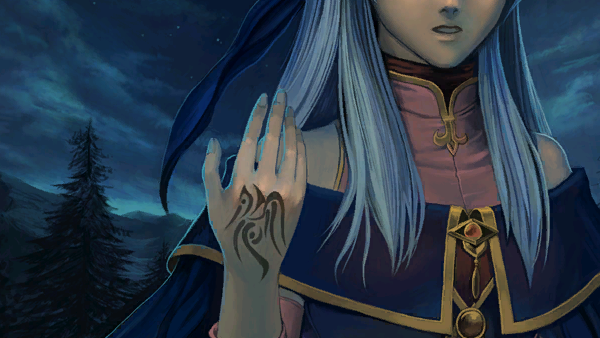
The game contrasts the source of Micaiah’s powers with another major character, Prince Pelleas. As Micaiah’s revolution gains traction, she aligns herself with Pelleas, the purported son of Daein’s previous king. In a moving scene, Micaiah asks Pelleas about a mark she notices on his hand, thinking that he too is of mixed heritage. But Pelleas’s response completely subverts her expectations: his mark appeared when he literally offered his soul as food to spirits so they would give him dark magic. When Pelleas assumes that Micaiah’s mark has the same origin as his, she refrains from correcting him, as her heritage is a secret. But this ambiguity over the true nature and sources of bodily marks speak to Radiant Dawn’s broader conceptions of power. Micaiah’s abilities derive from a blending of cultures that is revolutionary in the game’s setting. Pelleas, however, gains power by means that not only are quite compatible with the political status quo, but actively reinforce its violent, imperialist tendencies. Though it might seem odd to refer to a deal with soul-eating spirits as being within the status quo, it is familiar, even banal, in its form: he simply gains power by making a transaction. He doesn’t improve his magic by engaging other people or grappling with his own shortcomings; he simply purchases power. Though Micaiah and Pelleas both pay a cost for using their powers, Pelleas pays so that he can take lives with dark magic, and Micaiah pays so that she can ease the suffering of the oppressed with light magic. This exchange demonstrates a critical flaw in Pelleas’s character, one that goes on to jeopardize Micaiah’s revolutionary project.
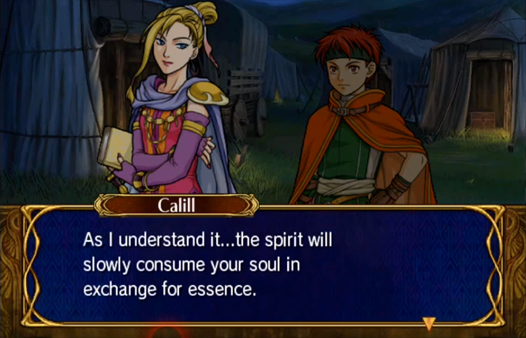
Pelleas fails to deliver a better future because his use of power fails to challenge the structures that produced Daein and Begnion’s violent, exploitative histories. After Micaiah’s revolution succeeds, Pelleas is crowned king of Daein, even though monarchy brought Daein to ruin just a few years prior. One of Pelleas’s first acts as the new king is to sign a peace treaty with Begnion, though he refrains from speaking with Micaiah about his decision. To make matters worse, it turns out to be no mere treaty, but a cursed Blood Pact that, if broken, would slowly wipe out Daein’s population. Leveraging the Blood Pact, Begnion’s leaders compel Daein’s armies to assist them in their imperialist wars against laguz nations. This plot twist serves as an effective analogy for how empires continue to extort and exploit ex-colonies after nominally granting them autonomy. Pelleas fails to understand the reality of the power dynamic between his fledgling government and Daein’s extremely well-armed and savvy occupiers. In his eagerness to return to familiar forms of power, Pelleas only reinforces the systems that produced Daein’s socio-political exploitation. These systems threaten to replicate the same situation in the laguz nations that are being invaded by Begnion. Means to power are themselves political; revolutionary futures cannot be won without revolutionary means.
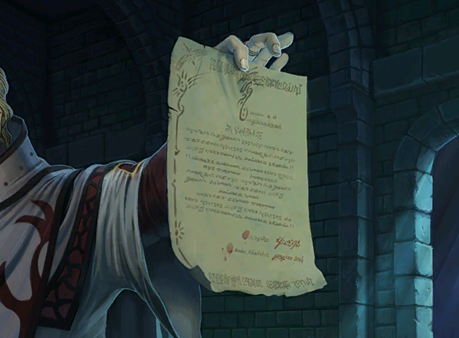
Though Micaiah ultimately breaks free of Pelleas’s failures through her revolutionary politics, the game’s critique of race chafes against its own setting. When Micaiah strikes back at Daein’s oppressors, she allies herself with both the beorc and laguz of other nations, building a coalition that transcends borders and nationalities. She operates far outside of the bounds that Pelleas confines himself to, a distance that is required to actually work towards unmaking them. As triumphant as this portrayal is, it is hamstrung by its explanation for the origin of Micaiah’s powers. While the suggestion that Micaiah’s heritage is the source of her powers seems positive, it insists that individuals like Micaiah have greater natural aptitudes simply because their parents are of different backgrounds. Rather than fully exploring how the experience of being marginalized can shape one’s perspectives and politics, the game is content with presenting a fetishistic explanation for Micaiah’s abilities.
With the introduction of Claude, however, Three Houses expands upon Radiant Dawn’s exploration of race, empire, and revolution. Like Micaiah, Claude is a protagonist of mixed heritage. Unlike Micaiah, however, Claude is brown-skinned, rendering him an outsider among the white-skinned people of Fódlan. That struggle is deeply familiar to me and many other people of color who grew up in America, but the game doesn’t limit its engagement with Claude’s identity to the color of his skin. For the first half of the game, Claude plays a role that resonated with me deeply. Though he is certainly a charismatic and clever student, there are numerous moments in the beginning of the game that indicate that he is putting on a performance, that he is doing his utmost to give the impression of an exemplary leader. From the very first time the protagonist meets Claude, they remark that Claude’s smile never quite reaches his eyes. But rather than portraying the performance as arising from some underlying cynicism, the game uses Claude’s performance to speak to how people of color feel pressured to put on perfect performances because of the doubts foisted upon them by racists. By structuring Claude’s narrative with such honesty, Three Houses does precisely what Radiant Dawn fails to do: it lets Claude speak about how his experiences as a person of color have shaped his understanding of politics.
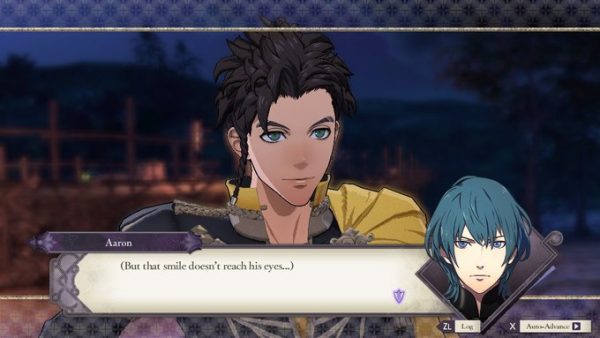
The exploration of Claude’s politics works precisely because it stems from the nuanced depiction of his struggles with his heritage. For the first half of the game, Claude is unwilling to open up to anyone about his past or his dreams for the future. After five years have passed in the game’s story, however, Claude is tasked with leading a revolution against the Adrestrian Empire, which paradoxically seeks to conquer all of Fódlan in order to free it. Faced with this all-consuming empire, Claude finally opens up to his allies. He explains that he is of mixed heritage, and that he has been brushed aside, belittled, and doubted simply because other nobles perceive him as a barbaric Almyran. That particular revelation shook me, as it recontextualizes countless conversations that Claude has with other characters in the game. In particular, Lorenz, one of the nobles in Claude’s alliance, frequently insists that he is more fit to lead the alliance than Claude. Here lies the reason for Claude’s performance: he has to constantly project perfection because any mistake or vulnerability would allow his detractors to pounce on him. But it isn’t just in Fódlan that Claude experiences racism—like Micaiah, he is treated as an outsider by both of his parents’ cultures. Unlike Micaiah, however, Claude seeks to explicitly address the social conditions that allow racism to fester.
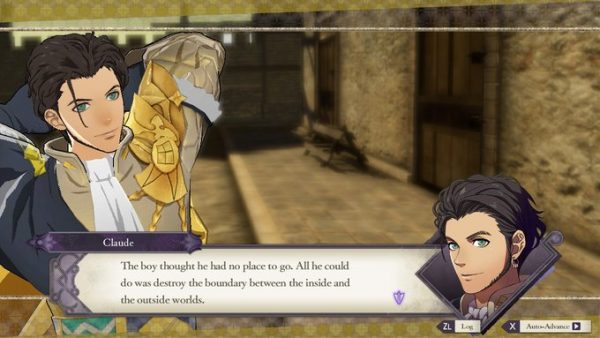
When Claude reveals his vision for the world after the revolution, he openly questions the concept of borders. The border between Fódlan and Almyra is militarized, and open travel between the two countries is precluded by a nigh-impenetrable fortress known as Fódlan’s Locket. Claude seeks to crack open the Locket, to unmake the military fortifications that strangle cultural exchange. He dreams and works towards a world where individuals from Almyra and Fódlan can meet each other outside of the fields of battle, where face-to-face interactions can facilitate the process of dissolving prejudice. Even though reality has taught us that racism cannot simply be solved by cultural exchange and travel, the fact that a hero such as Claude exists in a game at all left me flabbergasted. Unlike Pelleas, Claude understands that one can only break free from cycles of violence by upending norms, by challenging the order of the world. Unlike Micaiah, Claude fights for more than liberation—he directly reckons with politics and fights towards a clearly-rendered version of a better world.
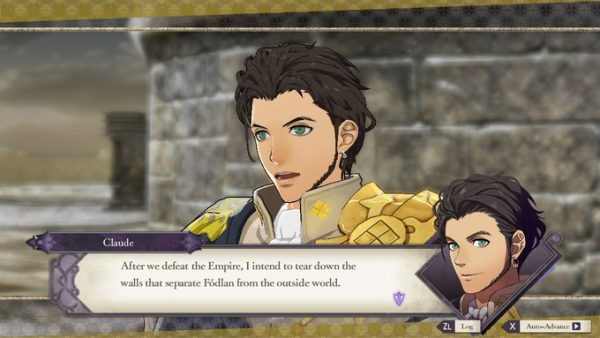
Through Micaiah and Claude, Radiant Dawn and Three Houses interrogate which forms of power can build a better world. By portraying the revolutionary Micaiah as succeeding where the reactionary Pelleas fails, Radiant Dawn posits that futures built from within the status quo collapse inward. Methods to power that arise from within the status quo only reinforce the structures that produce inequality in the first place. In order to break free of cycles of empire, we must break free from the structures that have produced it. Three Houses is built directly on top of this foundation, as Claude’s politics are explicitly revolutionary. This push towards explicitly revolutionary politics is enabled and complemented by Three Houses’s willingness to explore how Claude’s politics arise from his struggles with his heritage, which are foregrounded in the development of his narrative. With Claude, Fire Emblem finally presents a full portrait of a revolutionary protagonist of color: someone who understands the necessity of violent revolution, who struggles with performing perfection, who has to learn to be vulnerable with his friends, and who dares to dream of a world without borders.
Aaron Lascano is a Latinx writer and game designer from NYC. You can find him on Twitter @valascano, and you can find some of his game projects at valascano.itch.io.